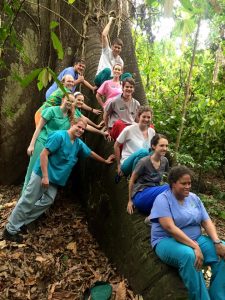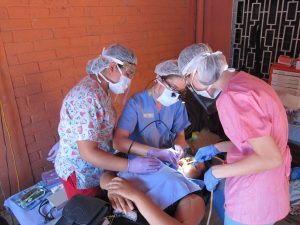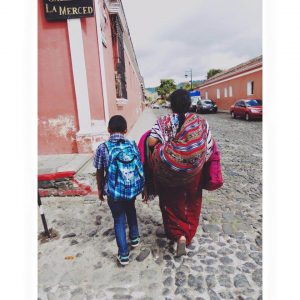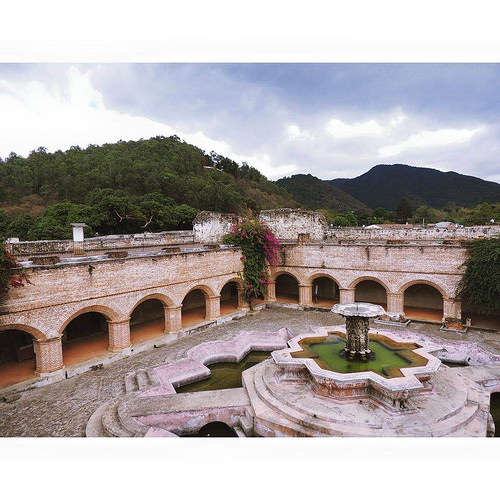This year, a wide array of students went to Suchitepequez, Guatemala, to provide medical care and provide quality healthcare to its citizens.
Every month, students and health professionals travel to West Guatemala with Health Talents International to carry out mobile medical and dental clinics. ACU has partnered with organization and regularly send students on mission trips with them.
In January, a group of 57, including eight nursing students from ACU, went south with HTI to perform general and gynecological surgeries.
 Julie Wheetley is the mission trips and events coordinator for HTI and recruits students and medical professionals for these trips.
Julie Wheetley is the mission trips and events coordinator for HTI and recruits students and medical professionals for these trips.
“There are two goals as far as Health Talents International is concerned,” Wheetley said.”We help local Christians evangelize to their neighbors and provide an outlet to students to expand their spiritual and medical education.”
Once a month, HTI sends surgical teams to Guatemala that consist of translators, surgeons, dentists, anesthesiologists and caretakers. There are no specific qualifications needed to go on a mission trip.
The past two years, groups of pre-health students, including students who hope to become doctors, occupational therapists, physical therapists, dentists and nurses, have spent their spring break serving with HTI. Last year students assisted with surgeries, and this year they traveled with mobile clinics and provided dental cleanings and treatments.
“We welcome anyone who has the heart to serve,” Wheetley said. “Anyone can come so long as they are willing to serve; anything that someone can contribute, we’re able to plug them in one way or another.”
HTI has been in partnership with ACU for more than 10 years.
Alicia Adams, a senior nursing major from Boerne, went with a group and was able to put some of what she learned into practice as well as affirm her call to nursing.
“I’ve always wanted to do missions in nursing,” she said. “This trip helped me to see the importance of being relational in nursing.”
A typical medical mission trip can be misconstrued as a group of people traveling to a poor location and providing medical care to those who can’t afford it or don’t have access to it – but this trip proved to be much more.
“I found out why it’s a good thing to go on a mission trip,” Adams said. “The reason they go is because it kind of fills their cup back up.”
Adams admitted that American patients aren’t always the nicest when receiving medical care, but the patients she worked with at Clinica Ezell, the local clinic, and other mobile clinics were appreciative of the care services they offered.
Jeremy Aymard, junior biology pre-med major from San Franscico, went to Guatemala on his spring break this year. Aymard said patients are grateful for the care they’re receiving despite having to arrive at the clinic location at 5 a.m. and often having to wait for hours to receive treatment.
“They’re the most content people I’ve ever met,” Aymard said. “No matter how much the Guatemalans suffered, some of them having their legs amputated from foot ulsers, they still left smiling.”
On this trip, missionaries were able to take their care a step further and pray and build relationships with patients, which made a difference in Adams’s eyes.
Mattresses, linens, supplies and equipment were piled into the back of a pick-up truck and driven to various locations across the country. When the students and doctors arrived and began setting up the clinic for the day, other HTI workers had already arrived and led a morning devotional with patients who were waiting to be seen.
“A really important aspect that plays a part in healing is community,” Adams said. “Whenever they were surrounded by community, they would physically feel better. Oftentimes it’s easy to forget the spiritual side of nursing; that really is an important part of healing.”
HTI sends evangelists to the clinic sites with the doctors and students. After the patients were seen by the doctors and got to visit the clinic’s pharmacy, the evangelist, the patient and the student accompanying the patient would circle up in prayer, offering simultaneous prayers in different languages.
As a nursing major, Adams has participated in clinicals and simulations that are preparing her to enter the workforce as a nurse, but she got a head start in Guatemala.
“We have a pretty limited array of what we can do in clinicals,” she said. “On mission trips, we’re still supervised by a nurse, but we function more on our own, they just let us be independent.”
Treating patients in developing nations differs from health care in the U.S. for a number of obvious reasons. The combination of differences in ailments, differences in medical facilities and available treatments and differences in patients allows ACU students to gauge the meaning of healthcare in an entirely new perspective. Aymard said the week he spent shadowing in Guatemala made him want to be a doctor more than all of the experiences he has had in the U.S. combined.
“I would do anything to go back,” he said. “It made me so passionate about going into the medical field.”
Adams worked alongside Dr. Walter Sierra, one of several physicians who work in Guatemala.
“Some nursing skills that I got to do as a nursing student included post-operative assessments, nursing progress notes, medication administration, or observation and IV insertion,” Adams said. “I also got to assist Dr. Sierra on two mobile medical clinics taking vitals, admission assessments and observations.”
This year, HTI’s goal is to treat more than 40,000 patients, and with the help of students and doctors, they plan to succeed.
“We learn a lot in nursing school,” Adams said. “But when we actually get to put it into practice, it’s pretty awesome.”

